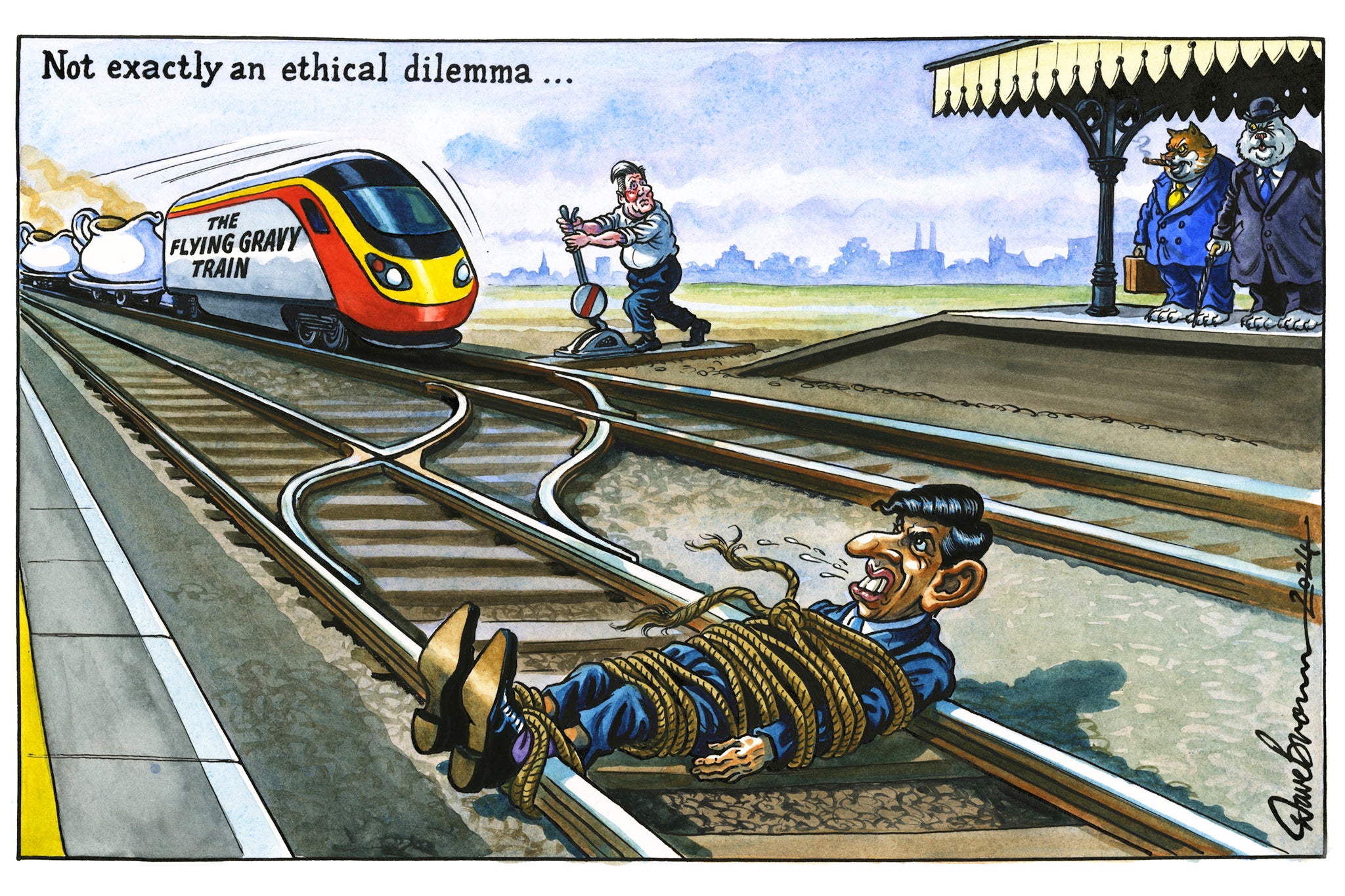Labour’s ‘radical’ plan to overhaul our railways isn’t quite as radical as it sounds
Editorial: Louise Haigh, the shadow transport secretary, was right to argue that ‘doing nothing is simply not an option’ and that ‘our broken railways are unfit to meet the needs of modern Britain’. So far, so good. But there is always a catch

The Labour Party has promised “the biggest overhaul to our railways in a generation” by renationalising the network if it wins this year’s general election.
The policy is not quite as radical as it sounds. Wisely, a Keir Starmer government would not waste taxpayers’ money on old-style nationalisation. Instead, it would transfer the 10 remaining rail operators’ contracts still in private hands into “public control” when franchises expire by the end of a five-year parliament, avoiding the compensation needed in an immediate transition.
Under Sir Keir, Labour has rightly moved a long way from Jeremy Corbyn’s pledge at the 2019 election to put the railways, energy utilities, water industry, postal services and broadband infrastructure in public hands. It is increasingly clear that an incoming Starmer government would have a rotten economic inheritance with no money for such extravagant schemes. Although it would set up a publicly owned Great British Energy company to invest in clean energy like offshore wind, the deservedly criticised water industry would be reformed through tougher regulation rather than state ownership.
On rail, four operators and Network Rail are already in public hands – a clear sign the privatisation of the network 30 years ago has failed. So there is now a strong case for this vital service to be under public control.
Labour has plenty of good ideas, including automatic refunds for delays and cancellations; better integration of timetables, tickets and fares; a best-price ticket guarantee like that introduced by Transport for London; digital season tickets across the network; and a new Passenger Standards Authority with more powers to hold the industry to account.
In a welcome shift from the ideological approach of the Corbyn era, Labour says it will focus on “the best of the private and public sector”. So private companies like Lumo and Hull Trains would continue to have “open access” to the network by paying a fee, and rolling stock and freight would remain in private hands.
Although the Conservatives have inevitably criticised Labour for an “unfunded spending promise,” their ability to attack it has been diluted by Labour’s decision to adopt a Tory plan to create an arm’s-length body called Great British Rail to run the network with rail industry experts rather than from Whitehall.
The Johnson government accepted this after a review in 2021 but it has not been implemented. The study by Keith Williams found the shake-up could save £1.5bn a year by reducing fragmentation, bureaucracy and waste – for example, battles between armies of lawyers over which company is responsible for delays and compensation.
Louise Haigh, the shadow transport secretary, believes her blueprint would save a further £700m a year by eliminating the “friction costs” of involving private firms. Many passengers, fed up with higher fares and unreliable service, will doubtless feel that any change could mean things could only get better. Opinion polls suggest two in three people support renationalisation.
Ms Haigh was right to argue that “doing nothing is simply not an option” and that “our broken railways are unfit to meet the needs of modern Britain”.
So far, so good. But there is always a catch: she was unable to promise that the £2.2bn estimated annual savings would be ploughed back into the railways – either to reduce fares or the £4bn-a-year subsidy from taxpayers.
Would Rachel Reeves, who would be Sir Keir’s chancellor, allow that? More likely, any savings would go into the Treasury’s coffers, which will face enormous demands to rescue (let alone improve) our crumbling public services.
Ms Reeves would inherit from Jeremy Hunt £20bn of unspecified cuts to “non-protected” departments like the Home Office and the Ministry of Justice, plus this week’s pledge by Rishi Sunak to raise defence spending, which would be hard for Labour to trim in a dangerous world. So it is perfectly possible to imagine Great British Railways losing out to the NHS in a battle for precious resources, just as British Rail did before privatisation. That would be unfair to the travelling public and potentially harm the drive to restore passenger levels to pre-pandemic levels.
The other potential flaw is that Labour’s sensible proposals to improve ticketing arrangements would not happen overnight and might have to wait until the whole network was under public control – perhaps not until 2030. Another delay that frustrated passengers could well do without.
Join our commenting forum
Join thought-provoking conversations, follow other Independent readers and see their replies
Comments
Bookmark popover
Removed from bookmarks